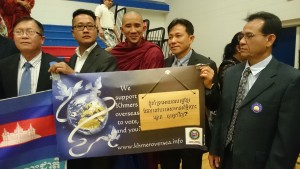When opposition leader Sam Rainsy last year turned his back on a promise to return to Cambodia and face a prison sentence dropped on him while he was overseas, he cited the potential for the government to use any subsequent protests or violence to derail election reforms.
“The ruling party wants to delay the election process, and to delay the election process, there must be incidents and escalating violence, which would give them the pretext they need to dismantle the CNRP, or to delay the election process,” Mr. Rainsy said at the time.
—News Analysis—

He decided to flee to Paris rather than rocking the boat, banking on the idea that the CNRP would win the next national election in 2018 as long as the voter list was cleaned of the potential for voter fraud.
But there is more than one way to delay the election process. And while Mr. Rainsy’s decision not to return might have helped avoid an outbreak of political violence, the CNRP has found itself hamstrung by creeping delays in the implementation of electoral reforms it has pinned its hopes on.
The projected start of voter registration has been pushed back from March to May to July to August—and now perhaps September. Civil society groups this week expressed concerns about the National Election Committee’s repeated delays in its plans to build a clean voter list from scratch before the 2017 commune elections.
Sophal Ear, an associate professor at Occidental College in Los Angeles and the author of “Aid Dependence in Cambodia: How Foreign Assistance Undermines Democracy,” said it appeared that the CPP was purposely trying to slow down reform.
“When it’s this many delays, and the answers don’t add-up, you betcha. Drag your feet until the changes that would benefit your opponent are practically impossible, run down that clock!” Mr. Ear said in an email.
Until the NEC finally removes all the double and missing names from the voter list by re-registering all 10 million eligible voters, the opposition party will remain in perpetual fear of giving the CPP pretext to derail its coveted reforms, he said.
“The CNRP is in a poor position not just until the new voter list is completed, but until they actually are allowed to win,” Mr. Ear wrote. “I hate to quote Stalin, but he did say ‘Those who vote decide nothing. Those who count the votes decide everything.’”
Thanks to painstaking negotiations between the CPP and CNRP in the aftermath of the contested 2013 elections, those who count the votes now include members of both parties. However, the NEC’s chairman, Sik Bunhok, is a former CPP lawmaker, and its controversial secretary-general, CPP stalwart Tep Nytha, was recently brought back for another term of service.
And with the 2017 commune elections looming, Mr. Rainsy said in an email on Thursday that he believed Prime Minister Hun Sen was purposely trying to slow down the electoral reform process and derail voter registration “because he would definitely lose any free and fair election.”

